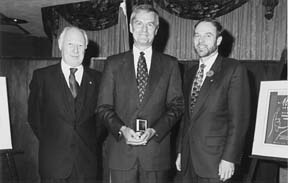
Michael Smith (left), David Harpp and Secretary of State (Science, Research and Development) Jon Gerrard
November 7, 1996
 Michael Smith (left), David Harpp and Secretary of State (Science, Research and Development) Jon Gerrard |
Diana Grier Ayton
Chemistry professor David Harpp has added yet another award to his growing collection. This year alone, he won a McGill teaching award, received the American Chemical Society's Edward Leete Award and the New England Association of Chemistry Teachers honoured him for furthering the study of chemistry.
His innovative use of lap-dissolve techniques to animate popular public lectures on the chemistry of everyday life, and his contributions to chemistry exhibits at such venues as Man and His World and the Old Port, have just earned him one of the 1996 Michael Smith Awards for Science Promotion. Smith, a UBC professor and winner of a Nobel Prize in 1993, donated part of his prize money to fund science awareness activities.
"I think Michael Smith did a good thing, with Industry Canada, to draw attention to science promotion," says Harpp. "In fact, I was surprised at how many different programs there are going on in Canada that I had never heard of."
Recognition is one thing, but Harpp thinks that more tangible support is also important. "I think the federal government should give modest grants to individuals who are doing things in schools to teach and promote science so they can buy books and information packages--things that their school budgets can't cover."
Harpp says he tries to spread his message wherever he goes, because there's no telling when it might make a difference. "I spoke at a lunch in the U.S. to a bunch of chemical company CEOs. I was urged them to set aside money for local schools and for people from their companies to go to schools to talk about science, as opposed to talking about jobs with their companies. I visited Kodak recently and the whole company is now doing outreach at schools. I'm not saying it's because of anything I said, but the more people talk about these things, the more gets done."
Political leaders could really make a difference, says Harpp, but they lack the background and perhaps also the conviction to establish science literacy as a national priority. Meanwhile, federal funding for R&D budgets shrinks each year.
"All it would take is for the prime minister of Canada or the president of the United States to say 'This is where we are going and we will lead the way,' and it would happen. I think politicians on the whole know diddly about science and are afraid of it. We should have science in all the grades all the way up like some countries in Europe. It's more of a sidebar option in North America. I'm not sure of the data in Canada, but in the U.S., about a third of high schools don't even offer chemistry or physics."
And the treatment of science in the media leaves something to be desired Harpp says. "At the awards last week, Michael Smith asked us what we thought of Bill Nye's TV show (Bill Nye the Science Guy, a frenetic rendering of basic science concepts for children). Smith said he thought he was a bit much, and I have to agree. On the whole he does a good job with some very slick explanations. I just wish he wasn't such a gooney bird. People argue you need that to get kids' attention, but if anybody remembers Mr. Wizard--he was cool and collected and he had a tremendous following. I don't like the mad scientist stuff."
As for the press, Harpp has praise for what many might consider an unlikely source for science news, but says we are badly served locally. "The National Enquirer actually talks about medical advances and small scientific things with complete accuracy and without garbled or sensational headlines. We used to pick it up to make fun of it and found that they had a lot of pretty good stuff, forgetting the gossip and the 'I had an alien's baby' stories. I'm not suggesting anyone pick it up for the science articles, but it does a better job than the Gazette, which I think deserves a failing grade for the volume and accuracy of its science coverage."
Whether the Gazette reports it or not, there is "wonderful stuff" happening in Montreal, thanks to its universities and research institutions, and there does seem to be a market for it, Harpp says. "When we organized the Expotec chemistry exhibit at the Old Port in 1995, we had around 3,000 visitors a day. About the only comparable exhibit in the U.S. was something set up at the Smithsonian, and that drew 500 to 700 a day."
And some of the city's permanent facilities can rightly claim world-class ranking, according to Harpp. "One of the top entomologists in the world gave a lecture at McGill a few weeks ago and commented that the Insectarium here in Montreal was the best he'd ever seen, and this was from the horse's mouth--the mouth of the horse."
Harpp says that it's a small moment from his trip to Ottawa for the awards last week that remains with him. "One of the other winners is a man from Nova Scotia who developed a kit for families, so that kids and their parents can do science together. He interrupted conversation at a breakfast before the presentation because he wanted to say how truly thrilled he was with the award. I know it will give him and his project a battery charge for years."